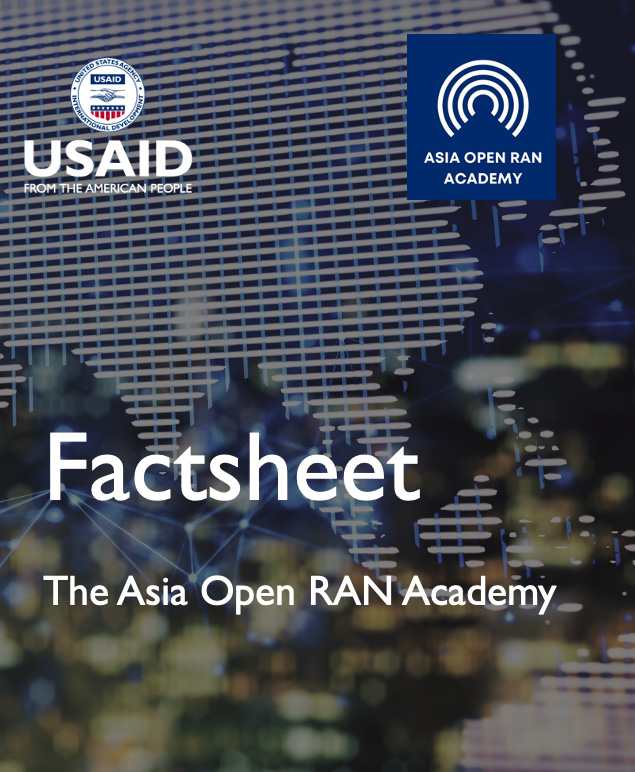Asia Open RAN Academy (AORA) envisions to benefit stakeholders concerned with digital access, equity, and inclusion for nation-building. It aims in advancing an open interoperable, reliable, and secure internet and vibrant digital economy through increased cooperation competition and choice.
The Asia open RAN Academy is an activity co-created with us aid funds as part of the Biden administration’s in Indo-pacific economic framework.
The academy is an alliance of academic, government, and Industry stakeholders in the Philippines and beyond. Asia Open RAN Academy has been incorporated as a nonprofit corporation in March 2023.
Asia Open RAN Academy revolves in the following principles: Partnerships, Open Education Resources, Curriculum Standards, and Community.
It has five strategic goals:
- First is to continuously evolve an Asian Smart Hub for open RAN standards and solutions.
- Second is to be a research-based Academy and Innovation incubator with virtual and physical laboratories.
- Third is to be the technology advocate.
- Next is to be cost effective and be on time in the delivery of solutions to clients.
- Lastly, is to be financially sustainable.
It is a new institution supporting human and institutional capacity development through the upskilling of the telecommunications workforce needed to test and deploy open network architectures to advance open, interoperable, reliable, and secure internet in the Indo-Pacific region. The Academy, launched in the Philippines mid-2022 (with planned regional expansion), will enable students to acquire skills that will increase their employment and salary options by providing access to course content, technical experts, an interoperability lab, and certification.
Learn more about Asia Open RAN Academy here:
The Asia Open RAN Academy (“the Academy”) is an activity funded by USAID that supports the U.S. Government’s Indo-Pacific Strategy (IPS). The Academy is an alliance of academic, government, and industry stakeholders in the Philippines and the broader Indo-Pacific region that share a common objective to advance an open, interoperable, reliable, and secure Internet and vibrant digital ecosystem through increased cooperation, competition, and choice.
The Academy seeks to accelerate the adoption of open RAN1 approaches by developing and promoting an open RAN curriculum and technical exchanges in the Indo-Pacific region to provide mobile network operators (MNOs) and internet service providers (ISPs) with the skilled workforce needed to test and deploy open network architectures. The curriculum, with both foundational and technical courses, will initially be rolled out across universities in the Philippines and, subsequently, across a consortium of learning institutions throughout the region. All academic lecturers will receive advanced open RAN training and hold relevant certifications related to open RAN.
To support technical exchanges, the Academy will enable learners to acquire skills that will increase their employment options by providing access to an interoperability lab, course content, technical experts, and certification. For example, engineering practitioners may enroll in stand-alone courses to augment their current understanding of RAN with critical features of open RAN (which has a significant computer programming dimension, an extension of Software Defined and Virtual Networks). On the other hand, engineering students may take open RAN courses as electives or as part of their regular post-baccalaureate or post-graduate education. Universities will be able to offer their open RAN courses adapted from the Academy curriculum at the start of the 2023 academic year.
The co-creation of the open RAN curriculum involved over a hundred interviews with academics, technologists, MNOs, and manufacturers. The curriculum was developed through focus group discussions with local and international stakeholders. The launch of the Academy was marked by a virtual symposium on June 29, 2022. This symposium signified the completion of the conceptualization phase of the Academy and the beginning of the institutionalization and expansion phase of the Academy. This includes a potential brick-and-mortar Academy, interoperability lab in Manila, and a Governing Board to supervise the initial institutionalization and long-term sustainability of the Academy in the Philippines and across the region.
1 Open RAN is a new approach to network architecture that opens up the telecommunications network, allowing Mobile Network Operators to choose the best products and solutions from a variety of vendors. It allows for the disaggregation of traditional network components into sub-elements through open interface specifications, software-based solutions, and vendor-neutral hardware.
